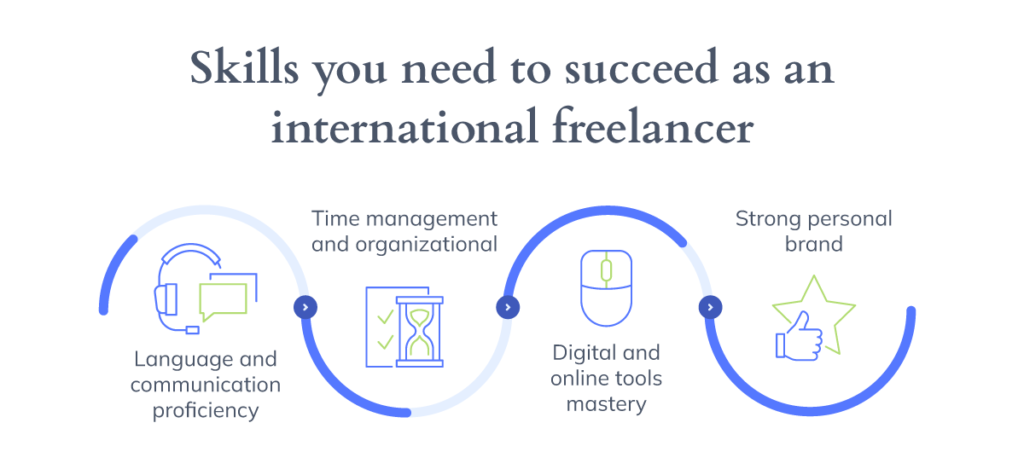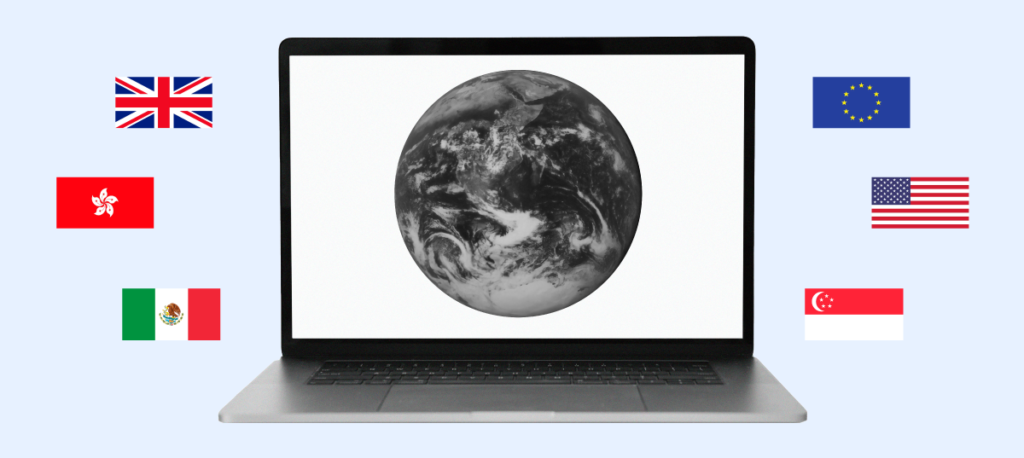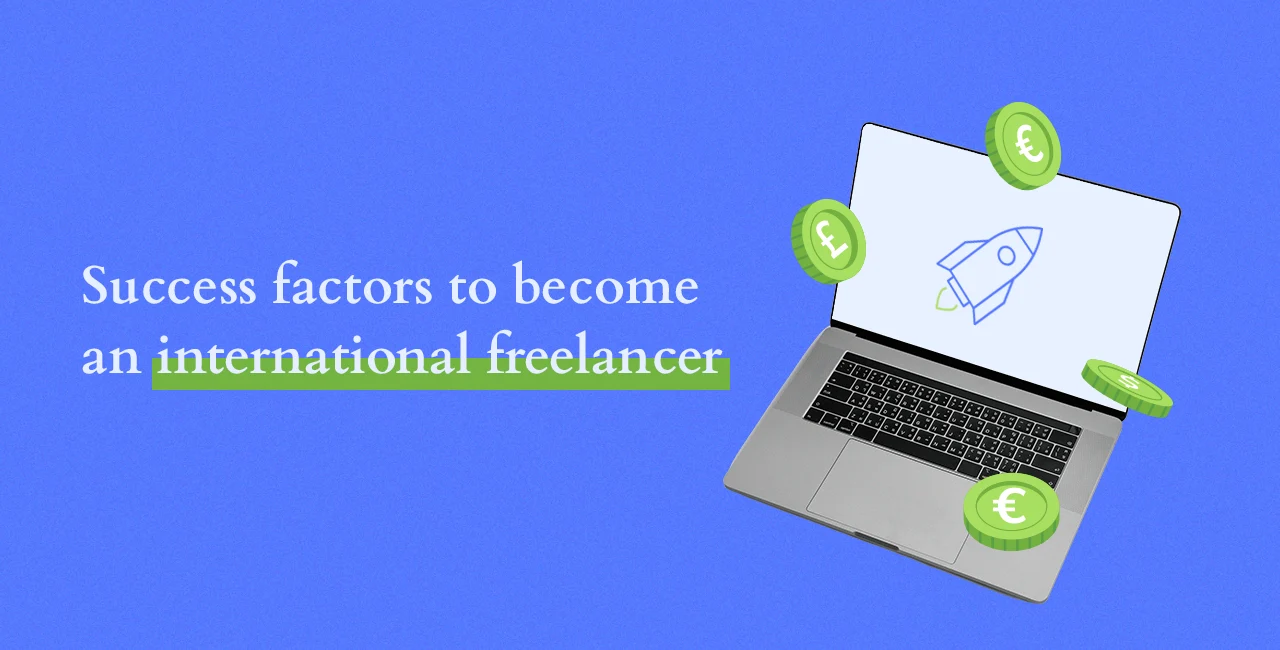An international freelancer is now experiencing a global allure of freelancing, which presents a tapestry of worldwide opportunities. The concept of freelancing, once a mere side pursuit, has now flourished into a full-fledged career option for many, paving the way for individuals to establish their own businesses, harness freelance jobs, and connect with international clients.
The surge in the digital nomad culture, combined with the flexibility of remote work, has significantly contributed to the popularity of freelancing. This seismic shift is reshaping how work is performed and redefining the traditional relationship between workers and financial institutions. The modern international freelancer navigates a unique path, often juggling multiple projects, managing international transactions, and fostering relationships with clients from diverse cultural backgrounds.
As the freelancing wave continues to increase, it brings forth a set of challenges and success factors that are distinct to this mode of work. International freelancers, in particular, must adeptly handle various aspects such as cross-border payments, cultural nuances in communication, and legal considerations while maintaining a steady stream of freelance jobs to sustain and grow their own businesses.
This comprehensive guide delves into the critical success factors for thriving as an international freelancer. From cultivating a robust personal brand to leveraging sophisticated financial tools for seamless transactions with global clients, we cover the gamut of strategies that can elevate your freelance journey.
Understanding the International Freelancer Landscape

Freelancing has transformed, driven by technological advancements and changing attitudes towards traditional employment. This shift has empowered many to embrace freelance work, offering a platform to be their own boss, and redefine the concept of a career.
Global Freelancing Trends
As digital connectivity soars, the global market for freelance work is expanding at an unprecedented rate. Today, more individuals are opting to become self-employed, attracted by the allure of flexible working hours, a diverse range of contract work, and the autonomy to choose projects aligned with their skills and interests. This surge in freelancing is not just a temporary phenomenon but a fundamental shift in the global workforce.
With the rise of online platforms, freelancers can now easily connect with businesses worldwide, offering their services in various sectors such as IT, design, content creation, and more. This global network has led to a democratization of opportunities, where geographical boundaries no longer restrict one’s ability to secure freelance jobs.
However, this growth also brings the necessity of formalities like obtaining a business license and drafting a comprehensive business plan, which are essential steps in legitimizing and protecting one’s freelance business.
Opportunities and Challenges for International Freelancers
Being an international freelancer presents a unique blend of opportunities and challenges. On the one hand, it allows individuals to craft a quality work life that aligns with their personal and professional goals, offering the freedom to have a work schedule on diverse projects and the chance to be their own boss. It opens doors to a world where diverse, enriching experiences and international clients become part of everyday work.

On the other hand, international freelancers face hurdles such as navigating different tax systems, understanding international contract work laws, and managing irregular income streams. The challenge of maintaining a steady flow of work and managing one’s finances is compounded when operating across multiple countries.
Moreover, transitioning from traditional employment to being self-employed requires a significant mindset shift. It’s not just about doing the job well but also about running a business efficiently, which involves marketing one’s skills, handling administrative tasks, and ensuring a consistent inflow of money.
Essential Skills for an International Freelancer

The journey to becoming a successful international freelancer is paved with continuous learning and skill enhancement. In today’s competitive market, possessing a specific skill set and a proven track record can set you apart from the many freelancers vying for the same opportunities. Beyond expertise in your field, essential skills are crucial for managing your business effectively and ensuring long-term success in the global freelance marketplace.
Language and Communication Proficiency
Clearly articulating your ideas and understanding your client’s needs is vital for establishing strong working relationships. For many freelancers, this often means crossing language barriers and adapting communication styles to suit diverse client bases.
Language proficiency, particularly in English, which is often considered the lingua franca of global business, can significantly enhance your marketability. However, learning additional languages can give you a competitive edge, especially when dealing with many clients from specific regions. This skill extends beyond mere verbal communication to include written correspondence, proposal writing, and contract negotiations, ensuring clarity and professionalism in all interactions.

Time Management and Organizational Skills
Time management and organizational skills are the bedrock of successful freelance work. As your own leader, it’s up to you to juggle various projects, meet deadlines, and consistently ensure quality output. Mastering these skills means more than just keeping a schedule; it’s about prioritizing tasks, setting realistic deadlines, and adapting to changing your clients’ needs.
Efficient time management also involves recognizing when to delegate tasks or turn down work that doesn’t align with your business plan or capacity. By staying organized and managing your time effectively, you can maintain a healthy work-life balance, which is crucial for long-term sustainability in freelancing.
Digital and Online Tools Mastery
Staying abreast of the latest technological advancements and being adept at using various digital tools can significantly improve your efficiency. This mastery also involves understanding basic cybersecurity principles to protect your and your clients’ data. In essence, the ability to leverage technology effectively is a key problem-solving skill that can greatly influence the success of your freelance business.
Building a Strong Personal Brand
Personal branding in freelancing goes beyond just a logo or a catchy tagline; it encompasses your entire business model, communication skills, work ethic, and how you present yourself to the world. It’s a blend of your professional expertise, personal values, and how you communicate your service offerings.
Your personal brand is your reputation. It’s what people say about you when you’re not in the room. It reflects your approach to work, how you interact with clients and problem solving abilities.
Cultivating a Diverse Client Base
A vital aspect of a successful freelancing career is cultivating and maintaining a diverse clientele. This provides stability and varied employment opportunities and enriches your professional experience. Having clients from different industries and geographical locations can safeguard your freelance business against market fluctuations and changes in local economies, including varying exchange rates.
Targeting and Retaining Global Clients

Attracting and retaining international clients is a key driver of success. This involves understanding the needs and preferences of new clients from different cultural backgrounds and adjusting your services to meet their specific requirements. It’s also crucial to stay informed about the global economic environment, including factors like exchange rates, which can affect how you price your services and negotiate contracts.
Effective strategies to target global clients include:
- Specializing in niche markets: Identify niches where your skills are in high demand and tailor your marketing efforts to these areas.
- Leveraging online platforms: Utilize freelancing platforms, social media, and professional networking sites to connect with potential clients worldwide.
- Building an international-friendly website: Ensure your website is accessible to a global audience, considering factors like language, content localization, and mobile responsiveness.
- Understanding cultural differences: Adapt your communication and work style to suit the cultural preferences of your clients.
Be proactive in addressing their needs and open to feedback, as this helps build trust and reliability – two pillars that any successful company or freelancer must establish.
Sustaining Long-Term Client Relationships

Sustaining long-term relationships with clients is essential for a stable freelancing career. These relationships are built on trust, quality, and reliability. Long-term clients provide a steady stream of work and can become advocates for your services, referring you to other potential clients.
Key strategies for sustaining these relationships include:
- Regular communication: Keep in touch with your clients, even when not actively working on a project. Regular updates, newsletters, or relevant industry news can keep you in their minds.
- Providing value beyond expectations: Always aim to deliver work that meets or exceeds expectations. This could be through innovative solutions, quicker turnaround times, or just being available when needed.
- Seeking feedback and acting on it: Regularly ask for feedback and be willing to make adjustments based on your clients’ suggestions.
- Being transparent: Be honest about your capabilities and timelines. If issues arise, communicate them early, along with potential solutions.
- Offering Customized Services: Tailor your services to meet the evolving needs of your clients. This demonstrates your commitment to their success.
Adapting to Cultural Differences
As you expand your freelancing career across borders, adapting to cultural differences is one of the most enriching yet challenging aspects. Understanding and respecting cultural nuances becomes essential whether you’re working with clients from EU countries, navigating time zone differences with a company in a new country, or considering travel visas for on-site meetings. This adaptation enriches your extensive experience and enhances your communication ability in a diverse global marketplace.
Navigating Cultural Sensitivities

Cultural sensitivities vary significantly from one country to another, influencing business practices, communication styles, and work ethics. As an international freelancer, recognizing and respecting these differences is crucial for building successful international relationships.
For instance, while negotiating your hourly rate or discussing project deadlines, it’s important to be aware of the local business etiquette. In some cultures, direct negotiation might be the norm, while a more subtle approach is preferred in others.
Similarly, understanding the significance of national holidays and work-life balance in your client’s home country can help in scheduling and project planning.
Another key aspect is the application process for work permits or travel visas, which might be necessary for on-site visits or long-term collaborations. Each country has its own set of rules and requirements, and being prepared for these legalities can save you from potential misunderstandings or delays.
Cross-Cultural Communication Techniques

Effective cross-cultural communication goes beyond just language proficiency; it’s about understanding the underlying cultural context and adapting your communication style accordingly. Here are some techniques to enhance your cross-cultural communication skills:
- Active listening: Pay attention to what is being said and how it is said. Non-verbal cues can be as important as verbal communication.
- Clarification: Don’t hesitate to ask for clarification to avoid misunderstandings, especially when dealing with complex project details or negotiating terms.
- Flexibility: Be adaptable in your communication. If a consumer prefers a certain communication channel or style, try accommodating it.
- Cultural research: Invest time in learning about the culture of your international clients. This shows respect and can help you avoid cultural faux pas.
- Time zone awareness: Be mindful of time zone differences when scheduling meetings or deadlines. Using tools that automatically adjust for time zones can be helpful.
Leveraging Technology and Tools
Technology is one of the strongest allies for international freelancers. It simplifies complex tasks and enhances communication, making it indispensable for anyone looking to set up a successful freelance business.
Essential Technology and Software for Freelancers

A robust technological toolkit for international freelancers is key to staying organized, efficient, and competitive. This toolkit should include:
- Communication tools: Platforms like Teams or Zoom are essential for communicating clearly with clients in different places.
- Project management software: Tools like Asana or Trello can help you keep track of your tasks and deadlines, ensuring that nothing slips through the cracks.
- Time management apps: Time-tracking apps, such as Toggl or RescueTime, are crucial for keeping track of how you spend your work hours.
- Financial management tools: Software like QuickBooks or FreshBooks can be invaluable for handling invoices and finances.
- Microsoft excel: With its versatile user interface and extensive functionality, Excel remains a staple for data organization, budgeting, and planning.
Keeping Up with Tech Advancements

New tools and software are constantly being developed, offering more efficient ways to manage your work and enhance your productivity.
To keep up with tech advancements:
- Follow tech blogs and websites: Regularly reading tech blogs and websites can keep you informed about the latest tools and trends in technology.
- Join online forums and communities: Platforms like Reddit or LinkedIn groups can be great resources for learning about new software and getting advice from fellow freelancers.
- Attend webinars and workshops: These can provide insights into effectively using and integrating new tools into your existing setup.
- Experiment with new tools: Don’t hesitate to try out new applications and software. Sometimes, experimenting with new technology can lead to discovering tools that significantly improve your workflow.
Mastering International Payments and Cash Management

For freelancers venturing into new country markets or juggling clients from various time regions, mastering the art of international payments and effective cash management is essential. The goal is to minimize costs and maximize earnings while also handling the logistics of getting paid for your work.
Challenges of Getting Paid from Abroad as a Freelancer

Other freelancers with prior experience working internationally understand that one of the major hurdles is managing payments from abroad. The challenges include:
- Currency exchange fluctuations: Fluctuations can impact how much money you actually receive after conversion.
- High transaction fees: Traditional financial institutions often charge hefty fees for international transfers.
- Delayed payments: International transactions can take longer, affecting your cash flow.
- Inconvenient working hours: Managing transactions across different countries can disrupt your regular working hours. Necessitating adjustments to your hourly rates and business set up to accommodate the diverse time regions of many countries.
Exploring Solutions with Bancoli’s Global Business Account

Bancoli’s Global Business Account emerges as a comprehensive solution, addressing the common financial challenges faced by freelancers working in new countries or managing clients from various parts of the world.
1. Multi-currency support: Bancoli’s platform allows freelancers to receive, hold, and manage money in various currencies. This feature is invaluable for freelancers who work with clients in different countries, as it offers the flexibility to be paid in the client’s local currency, reducing the need for currency conversion.
2. Competitive rates: Bancoli provides competitive exchange rates, ensuring that you get more money for your work at a lower cost. This is particularly beneficial when dealing with large sums or regular transactions.

3. Enhanced security: Security is a top priority, especially when dealing with international transactions. Our platform ensures that your funds are secure and protected, giving you peace of mind.
4. Convenience: Freelancers can easily access their funds or transfer money across borders without worrying about exorbitant fees. This level of convenience is crucial for maintaining a steady cash flow and efficient business operations.
If you want to avoid bank transaction fees and minimize payment times, you can create a verified Bancoli account. Our Global Business Account will help you to invoice and get paid in dollars from any country with reduced fees.

In conclusion
Whether you’re venturing into being an international freelancer abroad as a digital nomad the path is both exhilarating and challenging. The rise of the digital nomad visa has opened new avenues for freelancers looking to explore working abroad.
The key to a successful freelancing career, especially when working across different zones, is navigating the intricacies of international payments. While the requirement of a work visa may seem daunting initially, it opens doors to global experiences.
Working with international clients requires some planning and preparation to avoid potential challenges. Bancoli is the smartest bank account for freelancers who want to work with clients around the globe.
With the right approach, tools like Bancoli’s Global Business Account, and a willingness to embrace new experiences. Your freelancing career can take you to heights unimagined, transcending borders and cultural barriers.
Sign up today and begin to save time and accelerate cash flow.

Frequently Asked Questions
How can I manage currency exchange and payment challenges when freelancing internationally?
Managing currency exchange and payments as an international freelancer involves navigating fluctuating conversion rates and transaction fees. One effective strategy is to use financial platforms like Bancoli’s Global Business Account, which offers multi-currency support and competitive rates. This allows you to receive and manage payments in various currencies, minimizing losses due to currency rates.
What are the key considerations for obtaining a digital nomad visa or work visa for freelancing abroad?
When applying for a digital nomad visa or work visa for freelancing abroad, several key considerations come into play. Firstly, research the specific requirements of the country you wish to work in, as visa regulations vary significantly. Common requirements include proof of income, health insurance, and a clean criminal record. Understanding the tax implications in both your home country and the new country is also important. Consulting with legal experts or immigration advisors can provide clarity and guidance.
How do I adapt my freelancing skills and services to suit clients from different cultural backgrounds?
Adapting your freelancing skills and services for clients from diverse cultural backgrounds involves a mix of research, communication, and flexibility. Start by understanding the business etiquette, communication style, and work expectations in your client’s culture. This may include adapting to different time zones, understanding local holidays, and being sensitive to cultural nuances in communication. Enhancing your language skills or using translation tools can also be beneficial. Always be open to constructive feedback and willing to adjust your approach based on client preferences.




